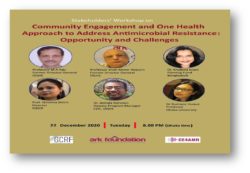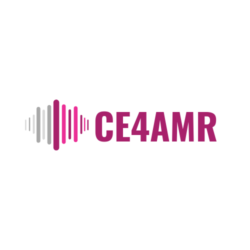National Stakeholder Workshop:Bangladesh
In this week’s blog we reflect on a National Stakeholder Workshop held in Bangladesh as part of the CE4AMR: One Health Approach Challenge Cluster. Over the winter each of the six projects involved in the cluster held workshops or webinars to explore the National priorities on AMR and the scope to involve Community Engagement approaches in achieving these priorities. This workshop was organised by the ARK Foundation; a non-governmental (NGO) organization dedicated to the socio-economic development of Bangladesh. Due to ongoing COVID-19 restrictions, the workshop was held as an online webinar in December 2020. This blog summarises the main points from a report written by Fariza Fieroze.
A list of Invitees was prepared by the team with the help of advisors of the organization to ensure a good mix of relevant stakeholders representing policy makers, donors, academics and implementers with an interest in AMR and community engagement, including stakeholders beyond the traditional boundaries of the human health sector, including animal health, WASH, environment, agriculture and fisheries. The workshop consisted of presentations on a Community Dialogues project and the first phase of the CE4AMR: One Health Approach Challenge Custer. A panel was then invited to discuss their observations and provide insights about the presentation and the topic of the workshop. After that session there was a short question answer session where some senior panelist and Prof. Rumana Huque answered some questions.
During the workshop, participants discussed what they consider to be the main challenges in AMR locally and agreed that overuse of antibiotic for humans and the availability of antibiotics without prescription are major challenges for AMR. Discussions also centred around the promotion and selling of antibiotics by pharmaceutical company representatives, participants discussed how representatives often promote the medicines in a wrong way and that healthcare providers prescribe antibiotics without proper diagnosis. Another main challenge discussed was in irrational agricultural use of antibiotics in poultry, fisheries and other sectors.
Participants of the workshop agreed on the following key messages on AMR in Bangladesh:
- Irrational use of antibiotic by human among human, poultry, agriculture, fisheries is the main challenge of AMR.
- Selling and prescribing antibiotic by the health care providers and sellers without proper indication have big contribution in AMR.
- Stakeholders agreed that only one health approach will be effective to control AMR in human, animal and environment sector.
In relation to community engagement, participants discussed how local communities can (broadly speaking) be separated into two categories; user/recipient and supplier. The main challenge identified by participants was in addressing the behaviours of the ‘supplier community’ which includes pharmaceutical companies, pharmacists, registered and unregistered village doctors and healthcare providers. Conversations also reflected the complex nature of community engagement methods, and a need for clarity in any messages shared with the community.
Participants of the workshop agreed on the following key messages on community engagement in Bangladesh:
- Community engagement process is a complex process. It has few elements like clarity, creativity, evidence based, equity, sustainability, flexibility
- Receiver and supplier are the basic classification of community. And supplier community have influence on the receiver community.
- Involving the supplier community in the CE process will be more effective
Finally, participants at the workshop discussed opportunities in using community engagement in tackling AMR. There are 6 main action plans of the Center for Disease Control in Bangladesh to address AMR and one of them is awareness building among the community – this presents an opportunity to focus on community engagement.
Participants of the workshop agreed on the following key messages on opportunities to use community engagement in AMR:
- One of the action plans to address AMR includes community engagement and there an opportunity to adapt CD
- There are evidence of success of audio-visual representation of messages to create awareness within the community that can be applied in future also
- There are existing guidelines for the health service providers on antibiotic use but aren’t followed properly. Advocacy, training should be provided to the health service providers.
Participants in attendance at the workshop appreciated the discussions around these issues and were able to discuss multiple intersectional issues faced in AMR control in Bangladesh. Experienced stakeholders were able to come together to share experiences and opinions and suggest key messages, challenges and opportunities.

